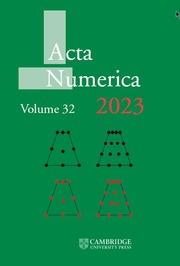Crossref Citations
This article has been cited by the following publications. This list is generated based on data provided by
Crossref.
de Gosson, Maurice A.
2020.
Symplectic coarse-grained classical and semclassical evolution of subsystems: New theoretical approach.
Journal of Mathematical Physics,
Vol. 61,
Issue. 9,
Iserles, Arieh
and
Webb, Marcus
2021.
From Operator Theory to Orthogonal Polynomials, Combinatorics, and Number Theory.
Vol. 285,
Issue. ,
p.
239.
Begušić, Tomislav
and
Vaníček, Jiří
2021.
Finite-Temperature, Anharmonicity, and Duschinsky Effects on the Two-Dimensional Electronic Spectra from Ab Initio Thermo-Field Gaussian Wavepacket Dynamics.
The Journal of Physical Chemistry Letters,
Vol. 12,
Issue. 11,
p.
2997.
Golubev, Nikolay V.
Vaníček, Jiří
and
Kuleff, Alexander I.
2021.
Core-Valence Attosecond Transient Absorption Spectroscopy of Polyatomic Molecules.
Physical Review Letters,
Vol. 127,
Issue. 12,
Sheng, Changtao
Ma, Suna
Li, Huiyuan
Wang, Li-Lian
and
Jia, Lueling
2021.
Nontensorial generalised hermite spectral methods for PDEs with fractional Laplacian and Schrödinger operators.
ESAIM: Mathematical Modelling and Numerical Analysis,
Vol. 55,
Issue. 5,
p.
2141.
Roulet, Julien
and
Vaníček, Jiří
2021.
An implicit split-operator algorithm for the nonlinear time-dependent Schrödinger equation.
The Journal of Chemical Physics,
Vol. 155,
Issue. 20,
Burghardt, Irene
Carles, Rémi
Kammerer, Clotilde Fermanian
Lasorne, Benjamin
and
Lasser, Caroline
2021.
Separation of scales: dynamical approximations for composite quantum systems*
.
Journal of Physics A: Mathematical and Theoretical,
Vol. 54,
Issue. 41,
p.
414002.
Roulet, Julien
and
Vaníček, Jiří
2021.
Time-reversible and norm-conserving high-order integrators for the nonlinear time-dependent Schrödinger equation: Application to local control theory.
The Journal of Chemical Physics,
Vol. 154,
Issue. 15,
Ohsawa, Tomoki
2021.
Approximation of semiclassical expectation values by symplectic Gaussian wave packet dynamics.
Letters in Mathematical Physics,
Vol. 111,
Issue. 5,
Bergold, Paul
and
Lasser, Caroline
2022.
An error bound for the time-sliced thawed Gaussian propagation method.
Numerische Mathematik,
Vol. 152,
Issue. 3,
p.
511.
Zhang, Jingxuan
2022.
A generic framework of adiabatic approximation for nonlinear evolutions.
Letters in Mathematical Physics,
Vol. 112,
Issue. 2,
Jin, Shi
Li, Xiantao
and
Liu, Nana
2022.
Quantum simulation in the semi-classical regime.
Quantum,
Vol. 6,
Issue. ,
p.
739.
Wang, Bin
and
Jiang, Yaolin
2022.
Optimal Convergence and Long-Time conservation of Exponential Integration for Schrödinger Equations in a Normal or Highly Oscillatory Regime.
Journal of Scientific Computing,
Vol. 90,
Issue. 3,
Chen, Ahai
Benoit, David M.
Scribano, Yohann
Nauts, André
and
Lauvergnat, David
2022.
Smolyak Algorithm Adapted to a System–Bath Separation: Application to an Encapsulated Molecule with Large-Amplitude Motions.
Journal of Chemical Theory and Computation,
Vol. 18,
Issue. 7,
p.
4366.
Lasser, Caroline
and
Su, Chunmei
2022.
Various variational approximations of quantum dynamics.
Journal of Mathematical Physics,
Vol. 63,
Issue. 7,
Begušić, Tomislav
Tapavicza, Enrico
and
Vaníček, Jiří
2022.
Applicability of the Thawed Gaussian Wavepacket Dynamics to the Calculation of Vibronic Spectra of Molecules with Double-Well Potential Energy Surfaces.
Journal of Chemical Theory and Computation,
Vol. 18,
Issue. 5,
p.
3065.
Colbrook, Matthew J.
2022.
Computing Semigroups with Error Control.
SIAM Journal on Numerical Analysis,
Vol. 60,
Issue. 1,
p.
396.
Christie, Robson
Eastman, Jessica
Schubert, Roman
and
Graefe, Eva-Maria
2022.
Quantum-jump vs stochastic Schrödinger dynamics for Gaussian states with quadratic Hamiltonians and linear Lindbladians.
Journal of Physics A: Mathematical and Theoretical,
Vol. 55,
Issue. 45,
p.
455302.
Jahnke, Tobias
and
Stein, Benny
2022.
A Multilevel Stochastic Collocation Method for Schrödinger Equations with a Random Potential.
SIAM/ASA Journal on Uncertainty Quantification,
Vol. 10,
Issue. 4,
p.
1753.
Scheidegger, Alan
Vaníček, Jiří
and
Golubev, Nikolay V.
2022.
Search for long-lasting electronic coherence using on-the-fly ab initio semiclassical dynamics.
The Journal of Chemical Physics,
Vol. 156,
Issue. 3,
 ${H}_2^{+}$
for small internuclear separation’, J. Phys. A 16, 2709–2720.CrossRefGoogle Scholar
${H}_2^{+}$
for small internuclear separation’, J. Phys. A 16, 2709–2720.CrossRefGoogle Scholar
